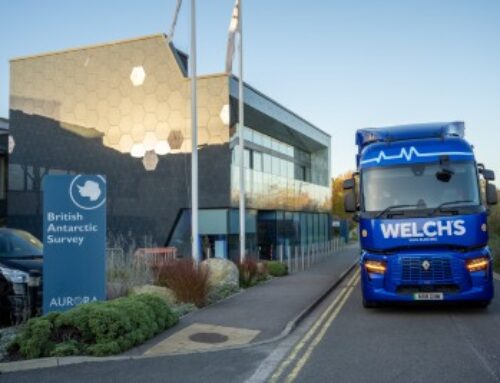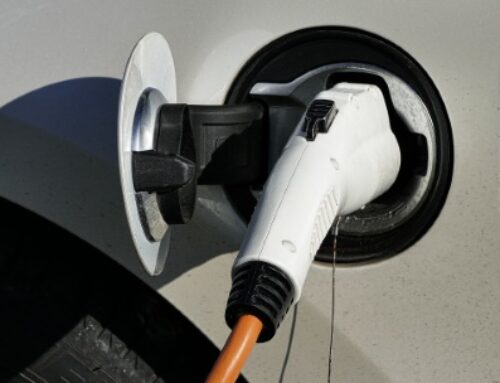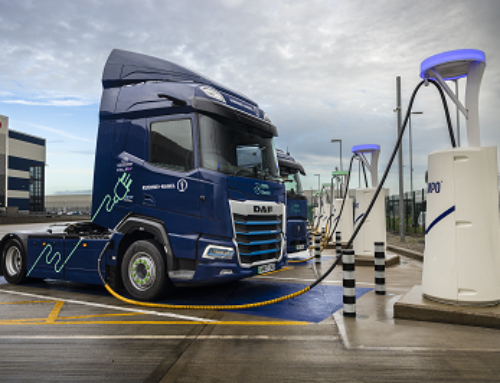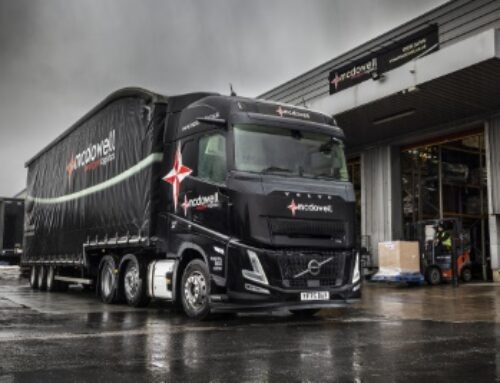Conference hears data is ‘key to decarbonisation’
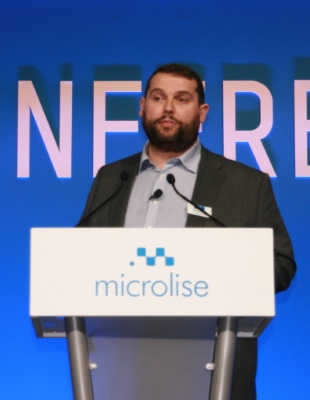 Gathering and analysing data is the key to decarbonising the UK freight sector, Michael Ayres, managing director of Flexible Power Systems (pictured, right), told the Microlise Transport Conference in Coventry.
Gathering and analysing data is the key to decarbonising the UK freight sector, Michael Ayres, managing director of Flexible Power Systems (pictured, right), told the Microlise Transport Conference in Coventry.
“Large quantities of data are needed to inform the decisions made in decarbonising transport,” he said.
He pointed out the size of the challenge ahead on the route to net zero.
“Light commercials are the furthest down the road, but even in this sector only one per cent of vans on the road are EVs, and EVs only make up three per cent of sales,” he said.
One area where real progress had been made was in mobile refrigeration: and this had been driven by the end of the use of rebated fuel in diesel fridges.
“The HGV sector is the most difficult to decarbonise,” he admitted. “A heavy truck requires 10 times the energy of a van, and the business case for zero-emissions HGVs just isn’t there at the moment.”
A combination of solutions would be required, with some low or zero-carbon fuels already available and appropriate for use in heavy vehicles.
“But there isn’t enough bio-methane available to power the whole HGV fleet,” he warned.
“Hydrogen has great potential in terms of fuel range and fast refuelling, but is a premium option in terms of vehicle cost and fuel price.
“BEV is the most cost-effective. The UK can generate enough electricity to power a national fleet of BEV trucks, but there is a challenge in its distribution.
“The internal combustion engine is fantastic technology. On the other hand, EVs are challenged by payload and range and energy distribution. The technology is evolving fast, which means rapid obsolescence and high cost for vehicles.”
Mr Ayres explained that vast amounts of data were being generated by current vehicles (and buildings) which could be used to inform choices as fleets moved towards decarbonisation.
“Data can be used to scale the transition to meet future demands,” he said.
“Initially, data can identify which vehicles can be switched for electrics first, and it can be used to create simulations to see how electric vehicles would do on defined routes and tasks and simulating tasks and rotas to make charging more efficient.”
He pointed out that planning had to start now. Sainsbury’s for example, was aiming for net zero by 2035, and kept its trailers for 10 years which meant that purchasing decisions today should bear this goal in mind.
Data from 180,000 journeys had been gathered by Sainsbury’s, enabling vehicles and buildings to be ‘right-sized’ for the tasks in hand.
Waitrose had used Flexible Power Systems to interconnect its data and get it all in one place, allowing dynamic optimisation of its operations informing changes in loads and vehicles. A pilot starting with seven vehicles had extended to 80.
Data analysis could reduce capital cost, by, for example, ensuring that new BEVs were only ordered with the battery size needed for their task.
Their use could then be optimised by using each vehicle as much as possible while reducing cost by smart charging.
“The main barriers to decarbonisation are cost, followed by complexity,” Mr Ayres summarised.
“Fleet managers have to work with facilities managers and energy buyers to decarbonise: large organisations will have to work collaboratively with different departments.”
In the heavy truck sector, return-to-base operations gave an opportunity for operators to get started with electric vehicles.
“But HGVs will need to be able to access specific public charging infrastructure, because of the prohibitive cost of installing it everywhere it is needed. Government intervention is required,” he warned.
He concluded: “SMEs get some support from government, but it is insufficient. Plug-in grants and workplace chargers are not enough.”
Meanwhile Mike Hawes, CEO of the Society of Motor Manufacturers and Traders, told the conference that battery-electric vans were running three or four years behind cars in the decarbonisation journey.
“Buses will probably be the first sector to decarbonise entirely,” he predicted.
“But we are going to need 3000 public chargers for trucks by 2025 if the Government’s decarbonisation targets are to be met,” he warned.
 Phil Roe, president of Logistics UK (pictured, left), warned that decarbonising transport entailed converting 226,220 organisations to zero emissions.
Phil Roe, president of Logistics UK (pictured, left), warned that decarbonising transport entailed converting 226,220 organisations to zero emissions.
“We have to be a bit less shy and talk with a stronger voice,” he urged. “We need to shape what’s desired: solutions are designed. What should the future fuelling infrastructure look like?
“There needs to be fair and equitable access to suitable electrical connections and an honest discussion about what it is going to cost to install the infrastructure.”
Honesty was also required in terms of what decarbonisation would do to productivity in an industry where labour was already short.
“The increase in external challenges will mean vehicles moving less payload,” he warned.









